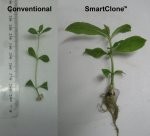Cashew improvement
The cashew tree (Anacardium occidentale) is an important crop with annual world retail sales of about AUD$4 billion, ranking with almonds and hazelnuts as one of the three largest tree nut crops. NuPlant controls what is generally considered the world’s best cashew breeding resource, located in the Northern Territory of Australia. From this genetic resource, through research by CSIRO and other agencies, as well as NuPlant, new varieties have been developed with performance substantially improved in three characteristics over world average. First, the yield of nuts has been increased from about 4 to 14kg per tree. Secondly, recovery, the fraction of nut weight represented by edible kernel, has been increased from 23% to over 30%. Thirdly, increase in kernel size to higher-priced grades provides approximately 15% increase in commodity revenues. NuPlant has both CSIRO-endorsed varieties (CS0300 suite of varieties) and the equivalent NuBred0300 with these characteristics. Moreover, NuPlant has also developed an additional suite of varieties (NuBred0700 varieties) for which initial performance estimates indicate yields approximately twice that of the NuBred0300 and CS0300 varieties.
Not only are revenues per hectare increased with these varieties, but relative costs are lowered. With a recovery of 23%, more than four tonnes of nuts must be harvested, dried and shipped to processors for each tonne of kernel produced, whereas these costs apply to only three tonnes when recovery is 33%. The number of nuts that must be extracted where average kernel size is 2.1g is only two thirds that for 1.4gm kernels, so that processing and subsequent grading costs are less per tonne.
|
NuBred Varieties |
CanProd |
Yield |
Kernel Recovery |
|
(Average) |
(gNIS/m2) |
(kg/tree) |
(%) |
|
NuB 0300 |
165 |
12.7 |
30.1 |
|
NuB 0700 |
306 |
29.1 |
27.2 |
SmartClone™ - Tougher plantlets faster
SmartClone™ changes the tissue culture paradigm. NuPlant’s key technology allows conditions to be customized for each growth phase for more robust plantlets, grading for uniformity, robotic handling for laboratory efficiency, easy soil transfer, and a head start for accelerated nursery growth.


